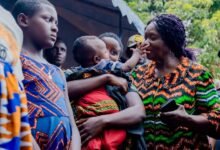
PThe Vice Chancellor of the University of Education, Winneba (UEW), Rev. Father Prof. Anthony Afful-Broni has tasked lecturers, researchers and students of the University to come up with good research works that can be able to raise external funding as well as contributing to the socio-economic development of the country.
He explained that, it was the duty of the leadership to inspire researchers, lecturers and students to come up with innovative ideas and the development of new technology or invention to support the national transformation process.
“Management has made available substantial amount of money to provide funding for individuals and teams to carry out research that can bring funding to this institution,” he said.
Rev. Father Prof. Afful-Broni was speaking at an event to climax the Faculty of Science Education week celebration held at the South Campus of UEW at Winneba.
There was an exhibition to showcase the various works carried out by students and lecturers from the faculty as part of the programme.
The Vice Chancellor further indicated that, dwindling government funding to tertiary institutions requires that universities come up with innovative ideas that would bring in additional financial support to run the institutions.
He stated that, UEW would not compromise on quality as it strives to ensure that a number of Ghanaians have access to tertiary education, saying, “We are committed to ensuring that our students are trained to contribute towards the development of the nation”.
Rev. Father Prof. Afful-Broni urged students from the Faculty of Science Education of the university to adhere to time since time is an important factor in any venture, saying, “We cannot compromise on time management”.
The Dean of Science Education, University of Education, Winneba (UEW), Prof. Ruby Hanson, in her address, underscored the need for the country to vigorously promote Science, Technology, Engineering and Mathematics (STEM) education at all levels.
The Faculty of Science Education of UEW, she said, had a major role to play in the on-going reforms in both basic and teacher education curricula, explaining that, “For the national reforms to succeed, there is a need for the faculty to support UEW and government to build the capacity of STEM educators to deliver excellent STEM education and also close equity gaps in participation”.
She stated that, the faculty had in place a curriculum team that was developing short courses and full-time blended-learning as well as professional development programmes for lecturers, teachers and teacher-trainers.
“Our main faculty programmes are STEM-based, and interwoven with ecological, economic and social impacts. We have many exciting courses which focus on Farm Science, Sports Science, Family Life Science, Science and Society, Mathematics and Culture, Engineering Mathematics, and everyday health affairs,” she said.
She further said: “As teachers, we can engage our students in mini projects that can provide rich, easily accessible contexts for integrating STEM and sustainable education”.
She explained that the creation of a school or community garden, farm, sports or science club, can engage the youth and help them to interact favourably as they learn to appreciate and accommodate each other.
From David O. Yarboi-Tetteh, Winneba







